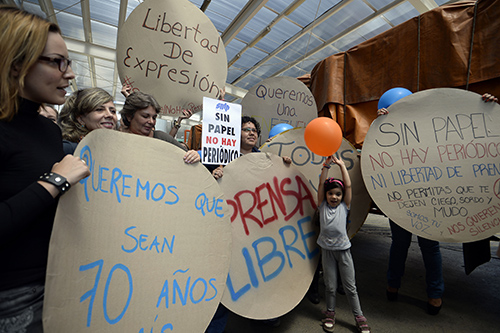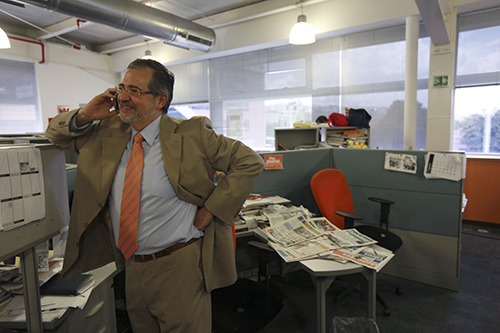Patricia Spadaro, news editor at the Caracas daily El Nacional, faces daunting challenges in putting out the newspaper. Her boss, El Nacional‘s president and editor Miguel Henrique Otero, has been living in exile since May 2015 after a top government official accused him of defamation. Amid the country’s deep economic crisis, half of Spadaro’s reporters have been laid off and there is less space for articles due to a newsprint shortage. Staff must also sometimes skip work to stand in line at supermarkets to buy milk, meat, and other scarce products.
Even in its reduced state, El Nacional continues to publish award-winning stories about political unrest, government corruption, skyrocketing crime, and the deteriorating national health system.
“I have immense admiration for my reporters,” Spadaro told CPJ in an interview at El Nacional‘s headquarters in Caracas. “They have put aside their fears to do good journalism even though the government is coming at them with everything it has.”
Founded in 1943 by the Otero family, El Nacional has always been known as Venezuela’s political newspaper. By comparison, crosstown rival El Universal specializes on economic issues.
Argenis Martínez, editorial vice-president for El Nacional, told CPJ that its editorial line often shifted with the political winds. In the early 1960s, it briefly supported Fidel Castro’s communist government in Cuba before adopting a more conservative stance. El Nacional initially backed the late President Hugo Chávez, who ushered in Venezuela’s socialist revolution in 1999. But the newspaper gradually turned against Chávez as his government became more authoritarian, and it has become extremely critical of current President Nicolás Maduro.
It’s a lonely position. CPJ has documented how, following the sale of El Universal and the country’s other large daily, Últimas Noticias, to business groups with close ties to the Maduro administration, those two newspapers appear to have softened their coverage of the government. Other independent newspapers, such as the Caracas-based Tal Cual and Correo del Caroní, published in the industrial city of Ciudad Guayana, have scaled back from daily to weekly publications.
“We are the only independent national daily left,” Otero told CPJ in a telephone interview from the U.S. where he spends much of his time since leaving Venezuela last year.
But El Nacional has paid a huge price.
Most Maduro administration officials refuse to talk to its reporters, who are often banned from government news conferences, Spadaro said. Government advertising have been pulled from the paper. Martínez pointed out that the National Electoral Council is obliged by law to take out advertisements in Venezuela’s main newspapers to inform voters about the location of polling places. Still, he said the council refused to buy advertising space in El Nacional ahead of the December 6 congressional elections.
The Communications Ministry, which handles government press inquiries, did not immediately respond to CPJ’s request for comment about the obstacles the paper says it faces.
Private advertising has dried up amid Venezuela’s severe economic crisis. Martínez said that due to widespread shortages, many companies no longer have much to sell “so why are they going to buy ads?” He added that the newspaper’s dwindling income has forced El Nacional to cut its staff from 652 to 330 employees.
“El Nacional still has excellent journalists but it is a very diminished newspaper,” Laura Weffer, who worked at the daily for 10 years before starting the independent news website Efecto Cocuyo, told CPJ.

Part of the problem is a shortage of newsprint, a product Venezuela does not produce. The government, which enacted currency controls in 2003, has for the past two years refused, without explanation, to sell U.S. dollars to El Nacional making it extremely difficult for the company to import newsprint. As an emergency measure, Martínez said, the Grupo de Diarios América, an alliance of prominent Latin American dailies, has opened a line of overseas credit to El Nacional allowing it to purchase newsprint and to continue publishing. Still, the once-thick broadsheet now publishes 24 or fewer pages per edition.
The newsprint shortage has also forced El Nacional to print fewer papers. Daily circulation has dropped from 90,000 to about 40,000 copies. But the newspaper’s Web readership is growing. According to Alexa, a U.S.-based company that tracks Web traffic, El Nacional is Venezuela’s second most popular news website after La Patilla, which mainly aggregates stories from other outlets.
Carlos Correa, who directs the Caracas-based free speech organization Espacio Público, said that the biggest problem for El Nacional is the government’s legal campaign against the newspaper. It has been hit with government fines, investigations, and lawsuits for everything from the content of its articles to the noise and smoke emanating from its printing plant, Martínez said.
The most serious legal broadside came from former national assembly president Diosdado Cabello, widely acknowledged as the second most powerful government official in Venezuela. In January 2015, El Nacional, Tal Cual and La Patilla reprinted a story from the Madrid-based daily ABC alleging that Cabello was involved in drug trafficking. In response, Cabello filed a criminal defamation lawsuit and a court last May barred Otero and 21 other journalists, editors and newspaper shareholders from leaving the country until the case is settled.
“They accused me of being a drug trafficker without any proof,” Cabello said on his television program shortly after the travel ban was announced. “I’ve requested … that they be prohibited from leaving the country.”
Otero was outside Venezuela when the travel ban was issued and El Nacional executives urged him not to come back, mainly because the judicial system is widely viewed by human rights groups as partisan and of doing the bidding of the Maduro administration. Analysts say that the most outrageous example of this involves opposition leader Leopoldo Lopez, who was sentenced to nearly 14 years in prison last year on charges of inciting violence after he led anti-government street protests in 2014.
“The repression is very strong, so anything could happen to me,” said Otero, who helps edit El Nacional by email, telephone, and Skype calls. But Otero predicted that due to the economic crisis and rising political unrest, the Maduro government will not last much longer–which could open the door for his return to Venezuela.
[Reporting from Caracas]
